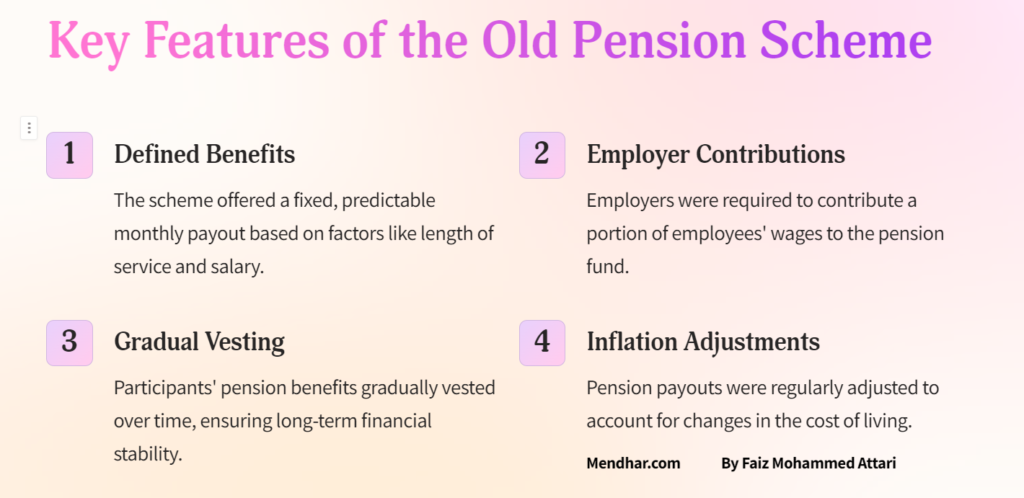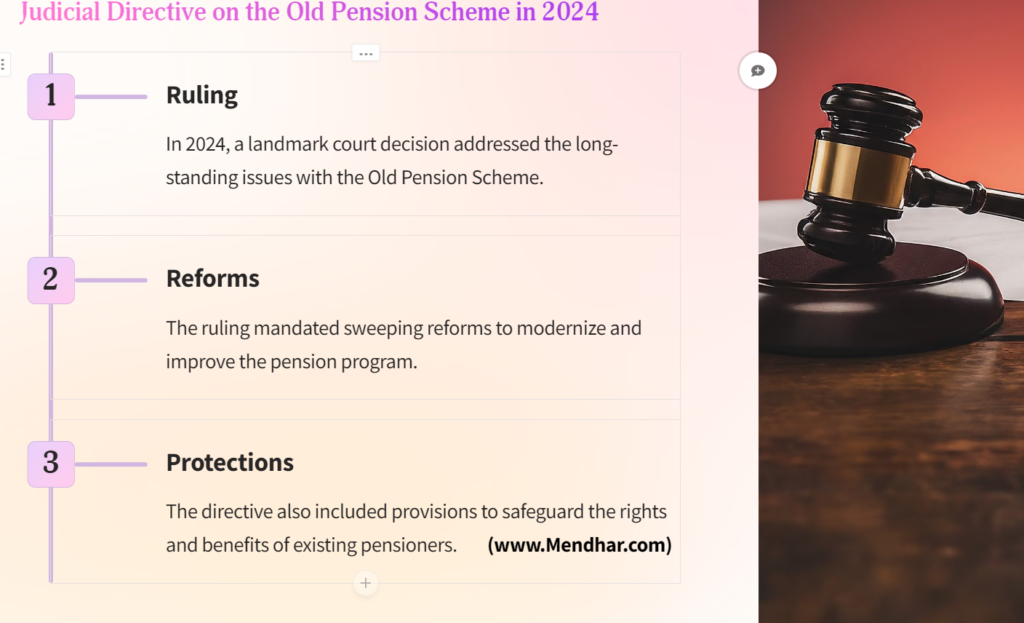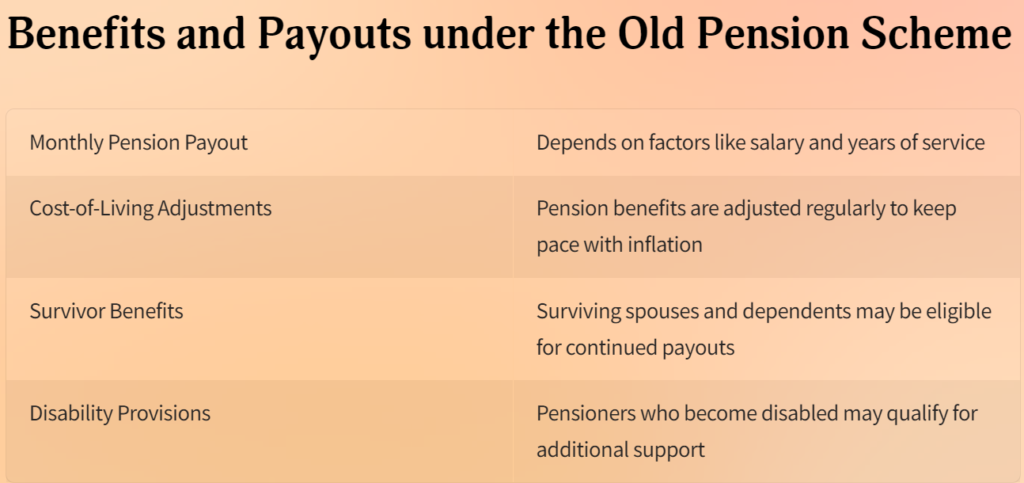Table of Contents
ToggleUnderstanding Old Pension Scheme Latest Update 2024: A Judicial Directive

In a significant turn of events, the Supreme Court of India has upheld the Delhi High Court’s judgment directing the Central Government to reinstate the Old Pension Scheme (OPS) for Central Government employees. This decision has ignited a ray of optimism among government employees, who have long advocated for the restoration of the OPS. The Supreme Court has given the Central Government a four-week window to present its case on why the OPS should not be reinstated, setting the stage for further deliberations on this crucial issue.
The All India State Government Employees Federation (AISGEF) has expressed confidence in the Supreme Court’s decision, viewing it as a positive step towards reinstating the OPS for all government employees. This latest development underscores the persistent efforts of employees and their unions in championing their rights and welfare.
The Importance of the Old Pension Scheme:
The old pension scheme holds immense significance for government employees due to its benefits and security. Unlike the new pension scheme, which operates on a contribution basis, the OPS ensures a fixed pension based on the employee’s last salary at the time of retirement. This stability and predictability provide a sense of financial security to retirees, allowing them to plan their post-retirement life with confidence.
Moreover, the OPS is deeply rooted in the principle of social security, offering a safety net to government employees who dedicate their careers to public service. The OPS not only recognizes their contributions but also honors the implicit contract between employees and the government, fostering trust and loyalty within the workforce.
Importance of Old Pension Scheme | Description |
|---|---|
| Security in Retirement | Provides a stable and predictable income in retirement, based on years of service and average salary, ensuring financial security for retirees. |
| Social Welfare | Promotes social welfare by offering a safety net for individuals after retirement, enabling them to maintain a decent standard of living without relying solely on family support or government assistance. |
| Attracting and Retaining Talent | Serves as a tool for attracting and retaining talent, particularly in government jobs, by offering the promise of a secure retirement and motivating employees to remain dedicated throughout their tenure. |
| Long-Term Financial Planning | Allows for informed long-term financial planning by providing assurance of a fixed pension amount, empowering individuals to make decisions regarding savings, investments, and expenditures with confidence. |
| Economic Stability | Contributes to economic stability by maintaining consumer spending levels through the provision of steady income for retirees, supporting overall economic growth and stability. |
| Reduced Dependency on Social Assistance | Eases the burden on social assistance programs and public funds by reducing the reliance of retirees on government welfare schemes, thereby freeing up resources for allocation to other critical areas. |
| Promoting Dignity in Aging | Fosters dignity in aging by empowering retirees to maintain independence and pursue personal interests without the constant worry of financial insecurity, enhancing their overall quality of life and participation in communities. |

Employee Advocacy and Collective Action:
The journey towards reinstating the OPS has been marked by relentless advocacy and collective action by government employees across the country. From petitions and rallies to legal battles, employees have spared no effort in voicing their demands and concerns.
The issuance of notices to Members of Parliament (MPs) by the joint struggle steering committee and the mega rally organized by All India State Government employees exemplify the determination and unity of the workforce. These actions not only demonstrate the widespread support for the OPS but also serve as a reminder of the power of collective voice in shaping policy decisions.
The recent developments concerning the Old Pension Scheme (OPS) for Central Government employees in India have been significant. The Supreme Court of India recently upheld the Delhi High Court’s decision, directing the Central Government to reinstate the OPS. The Supreme Court has given the Central Government a four-week period to provide justification for not restoring the OPS. The matter is scheduled for further hearing in February 2024.
The Central Government has announced its compliance with the Supreme Court’s directive and has committed to submitting an application within the specified timeframe. Additionally, the All India State Government Employees Federation (AISGEF) has expressed optimism regarding the restoration of the OPS for all government employees by the Supreme Court.
Furthermore, a panel of High Court Judges has granted the petitioner’s plea to reinstate the old pension scheme for the year 2024. The judges emphasized the importance of pensions for government employees. Consequently, the Delhi High Court has ordered the state government to reinstate the benefits of the old pension scheme for eligible individuals within one month.

Conclusion:
The latest update on the old pension scheme signifies a crucial juncture in the ongoing discourse surrounding pension reforms in India. With the Supreme Court’s intervention and the unwavering advocacy of government employees, there is renewed hope for the restoration of the OPS and the safeguarding of financial security for retirees.
As the dialogue continues, it is essential for all stakeholders to engage in constructive discussions and prioritize the interests of government employees. By working together, we can pave the way for a pension system that reflects our collective values of fairness, security, and dignity in retirement.
Frequently Asked Questions About the Old Pension Scheme Latest Update
What is the Old Pension Scheme (OPS)?
- The Old Pension Scheme (OPS) is a pension scheme for government employees that provides a fixed pension based on the employee’s last salary at the time of retirement. It offers financial security and stability to retirees.
What is the Latest Update on the Old Pension Scheme?
- The latest update on the Old Pension Scheme involves a directive from the Supreme Court of India upholding the Delhi High Court’s judgment to restore the OPS for Central Government employees. The Supreme Court has asked the Central Government to present its case within four weeks, initiating further deliberations on the matter.
Why is the Restoration of the Old Pension Scheme Significant?
- The restoration of the Old Pension Scheme is significant because it addresses the concerns of government employees regarding financial security in retirement. The OPS provides a fixed pension, offering stability and predictability to retirees, unlike the new pension scheme, which operates on a contribution basis.
What are the Benefits of the Old Pension Scheme?
- The Old Pension Scheme ensures a fixed pension based on the employee’s last salary at the time of retirement, providing financial security to retirees. It honors the implicit contract between employees and the government, fostering trust and loyalty within the workforce.
What Actions have Government Employees Taken to Advocate for the Old Pension Scheme?
- Government employees have taken various actions to advocate for the restoration of the Old Pension Scheme, including issuing notices to Members of Parliament (MPs) and organizing rallies and protests. These collective actions demonstrate the widespread support for the OPS among government employees.
How Does the Supreme Court’s Intervention Impact the Future of Pension Reforms?
- The Supreme Court’s intervention in upholding the Delhi High Court’s judgment marks a significant development in the discourse surrounding pension reforms. It signals a potential shift in the trajectory of pension policies and underscores the importance of prioritizing the welfare of government employees.
What Can Employees Expect in the Coming Months Regarding the Old Pension Scheme?
- Employees can expect further deliberations and legal proceedings regarding the restoration of the Old Pension Scheme in the coming months. The Supreme Court’s directive has initiated a process that may lead to significant reforms in pension policies, potentially reinstating financial security for retirees.
How Does the Old Pension Scheme Differ from the New Pension Scheme (NPS)?
- The Old Pension Scheme provides a fixed pension based on the employee’s last salary at the time of retirement, whereas the New Pension Scheme operates on a contribution basis. The OPS offers stability and predictability, while the NPS depends on the contributions made by employees during their service.



informative